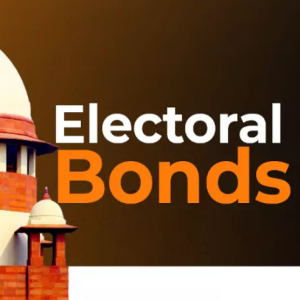
.png) Joseph Maliakan
Joseph Maliakan

In a really bold ruling to protect the fundamental rights of the people of the country, which incidentally is a terrible blow to the ruling National Democratic Alliance, especially the Bharatiya Janata Party, the Supreme Court on Thursday, February 15, struck down the Electoral Bonds Scheme introduced by the Union Government in January 2018 to "cleanse the system of political funding in the country." Ironically, the Electoral Bonds scheme envisaged donations to political parties through the anonymous purchase of Electoral Bonds by individuals or corporate houses anonymously, without any limits, actually legalising kickbacks for favours to corporate entities.
A constitution bench of the Supreme Court comprising Chief Justice of India, D Y Chandrachud and Justices Sanjiv Khanna, B. R. Ghavai, J. B. Pardiwala and Manoj Misra unanimously struck down the scheme as unconstitutional on the ground that it violated freedom of speech and ex
The Supreme Court also struck down amendments to the Income Tax Act and Representation of People Act, which made the donations anonymous. It also said the amendments to the Companies Act, allowing blanket corporate funding, were "unconstitutional". Before the Companies Act amendment in 2017, loss-making companies were not allowed to donate to political parties. Also, there was a cap on the amount of donations by companies.
The judgement further said, "At a primary level, political contributions give a seat at the table to contributors, i.e., it enhances access to legislators. This access also translates into influence over policymaking. There is also a legitimate possibility that financial contributions to a political party would lead to a quid pro quo arrangement because of the close nexus between money and politics. The electoral Bonds scheme and the impugned provisions, to the extent that they infringe upon the right to information of the voter by anonymising contributions through electoral bonds, are violative of Article 19(1)(a).
The Supreme Court also directed the State Bank of India, the issuing bank, to stop the issuance of the bonds forthwith. The SBI shall submit the details of electoral bonds purchased since the interim order of the court dated April 12, 2019, to date to the Election Commission of India. The details shall include the date of purchase of each electoral bond, the name of the purchaser of the bond and the denomination of the bond purchased. The SBI shall also submit details of the political parties that have received contributions through electoral bonds since the interim order dated April 12, 2019, till the present day to the ECI. SBI must disclose details of each electoral bond encashed by political parties, including the date of encashment and the denomination of electoral bonds. The SBI shall submit all the information to the ECI by March 6.
Further, ECI shall publish the information received from the SBI on its website by March 13, 2024. Electoral Bonds within the validity period of 15 days that have not been encashed by the political parties yet shall be returned to the political party to the purchaser. The bank shall then refund the amount to the purchaser.
The court held that the restrictive means test of the doctrine of proportionality is not satisfied and that there are other means other than electoral bonds to curb black money, even assuming it is a legitimate objective. The infringement of the right to information is not justified.
Admitting that the right to informational privacy extends to financial contributions, CJI Chandrachud ruled that a double proportionality standard was applied to balance the conflicting right to information and informational privacy. The court rejected the Union Government's argument that Clause 7(4)(c)of the scheme balances the two rights and held that the provision tilts the balance in favour of the right to informational privacy because the proportionality prong of the proportionality standard is only partly fulfilled. Accordingly, Chief Justice Chandrachud held that the Union government had failed to establish that the measure adopted in clause 7(4)(c) was the least restrictive.
Significantly, the Supreme Court found the amendment to Section 182 of the Companies Act permitting unlimited political contributions by companies to be manifestly arbitrary for several reasons, mainly the disproportionate influence wielded by companies in the electoral process compared to individuals, emphasising the potential for transactions made with the intent of securing benefits in return. In this context, The CJI said that contributions made by individuals have a degree of support or affiliation to a political association. However, contributions made by companies are purely business transactions made with the intent of securing benefits in return. Therefore, "The amendment to section 182 is manifestly arbitrary for treating political contributions by companies and individuals alike", the order held. The SC judgement very pertinently also stressed that the amended section 183 of the Companies Act, by permitting unlimited corporate contributions, authorises unrestrained influence of companies in the electoral process, which is violative of the principles of free and fair elections and political equality captured in the value of "one person, one vote".